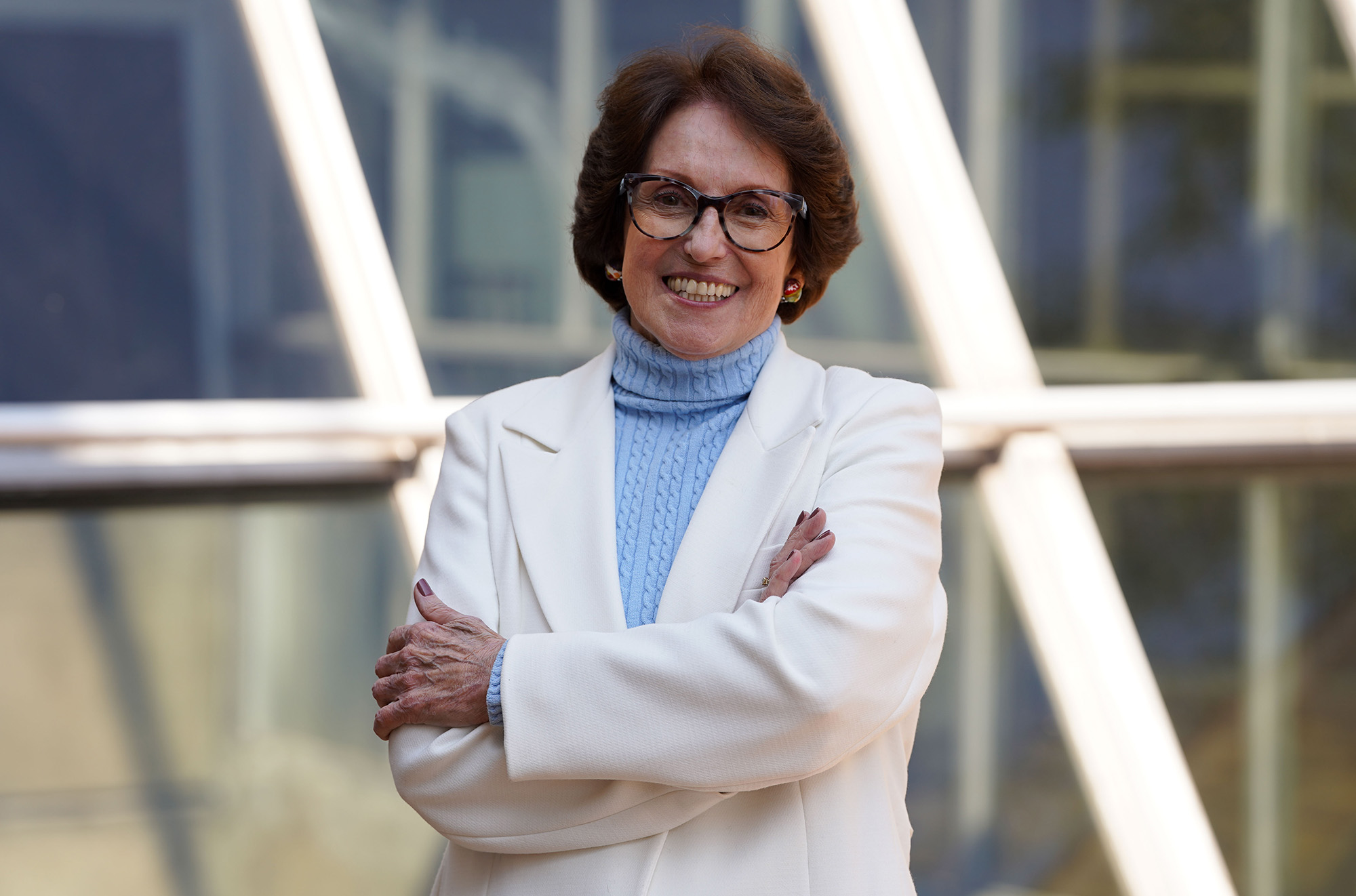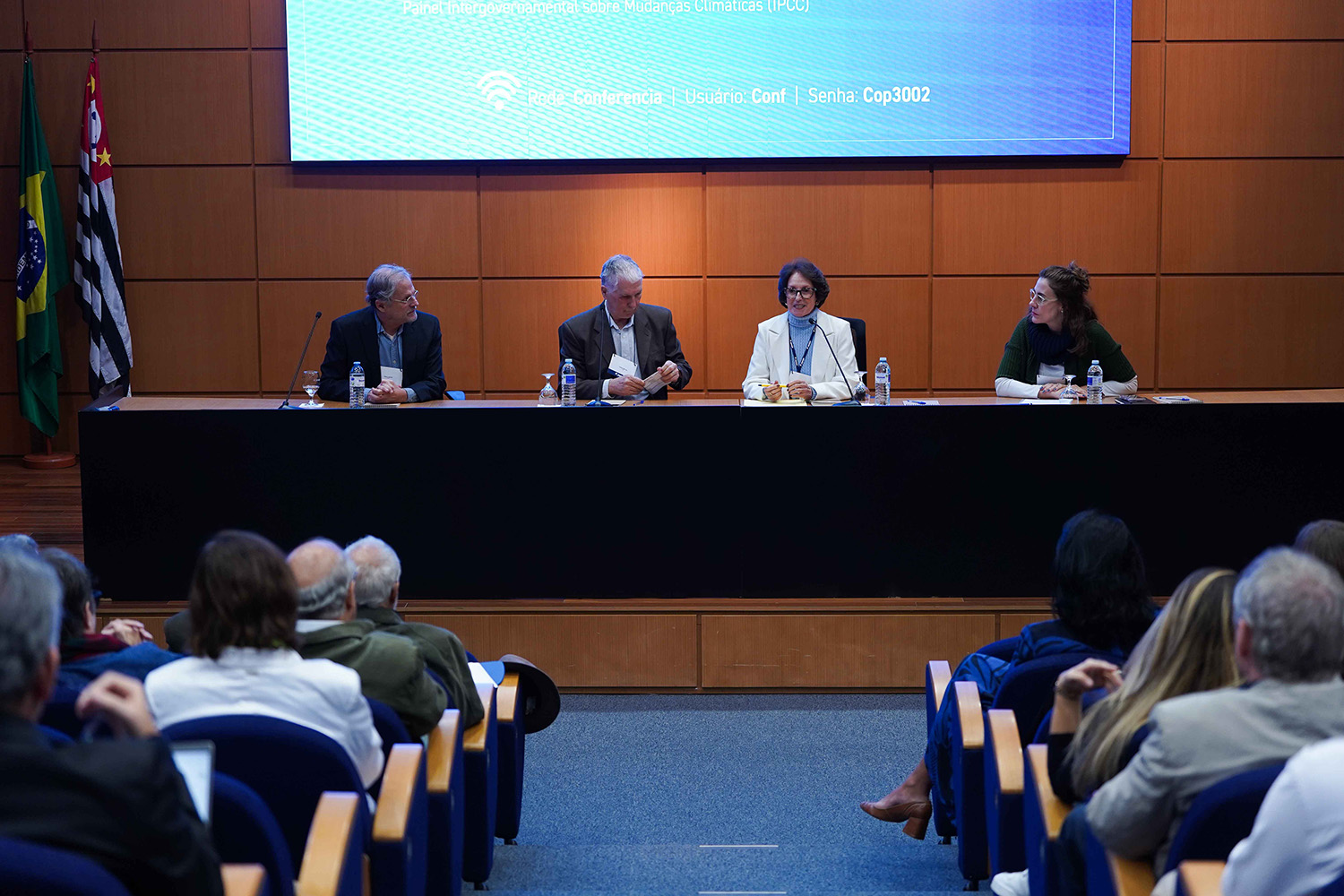


The conference took place on May 30th at the FAPESP headquarters (photo: Daniel Antônio/Agência FAPESP)
Published on 06/16/2025
By José Tadeu Arantes | Agência FAPESP – The energy transition is not aligned with the goal of limiting the global temperature increase to 1.5 °C. Fossil fuels continue to dominate the energy mix of the world’s largest economies, which are also the largest emitters of greenhouse gases. Therefore, achieving the goals of the Paris Agreement becomes more difficult every year. These harsh findings were presented by Thelma Krug, a researcher, during the fourth FAPESP 2025 Conference: “Contributions to COP30: Energy Transition”, held on May 30th.
Krug served as vice chair of the United Nations (UN) Intergovernmental Panel on Climate Change (IPCC) from 2015 to 2022, and she is a member of the FAPESP Board of Trustees. She has a PhD in spatial statistics from the University of Sheffield in the United Kingdom. She participated in the Earth Observation Coordination at the National Institute for Space Research (INPE) and currently heads the Department of Policies to Combat Deforestation at the Ministry of the Environment.
It is worth remembering that the Paris Agreement, which was ratified in 2015 by 194 countries and the European Union (the United States withdrew in January of this year, during the second term of the Trump administration), set a goal to limit the average global temperature increase to below 2 °C above pre-industrial levels by the end of this century (2100), while striving to restrict the increase to 1.5 °C.
Despite her less-than-auspicious findings, Krug described herself as “optimistic” and stated that she “hasn’t lost hope that the Paris targets will be met.” One sign pointing in this direction is the growth of the renewable energy segment in the total primary energy supply of the G20 countries. “In 2023, there was a record in the implementation of new installed renewable energy capacity. We had 308 GW in 2022 and moved to 473 GW in 2023. Of the total renewables added, 63% occurred in China, 15% in the European Union, and 7% in the United States,” she said.
The researcher pointed out that the use of fossil fuels has slowed down, while the use of renewables has accelerated. However, fossil fuels still predominate. “Practically 80% of global energy consumption is attributed to the G20 countries, which depend on fossil fuels for more than 70% of their primary energy generation,” she explained.
With a view to achieving the 1.5 °C target, the First Global Stocktake of the Paris Agreement, in December 2023, urged participating countries to triple their installed renewable energy capacity, double the rate of improvement in energy efficiency, and achieve net-zero greenhouse gas emissions by mid-century.
“A recent analysis indicates that tripling installed renewable energy capacity is an ambitious yet achievable goal. Given the record annual deployment that’s taking place, mainly with the growing incorporation of photovoltaic energy and its competitiveness with fossil fuels, it’ll soon be much more advantageous to switch to renewable energies than to maintain a fossil-based energy matrix,” Krug argued.
The 30th United Nations Climate Change Conference (COP30) will take place in Belém, the capital of the Amazonian state of Pará in Brazil, in November of this year. According to the researcher, it will be a critical moment for countries to assess their ambitions in terms of renewable energy and update their Nationally Determined Contributions (NDCs) – voluntary commitments that each country presents under the Paris Agreement with the aim of combating climate change. “All isn’t lost. The IPCC said in its mitigation report that we already have technologies available today that can reduce 2019 emissions by half by 2030. The problem isn’t the lack of these technologies, but rather the barriers to their implementation. Financial, training, and political barriers that need to be overcome,” Krug emphasized.
At the end of her speech, the researcher emphasized: “Time is short. The window is closing. We’ve already temporarily exceeded 1.5 °C. This doesn’t mean that we’ve failed. It means that we need to act. Urgently.”
The 4th FAPESP 2025 Conference, “Contributions to COP30: Energy Transition”, was opened by Professor Oswaldo Baffa Filho, the coordinator of the Organizing Committee for FAPESP Interdisciplinary Conferences and Schools. Professor Gilberto Jannuzzi, a professor at the State University of Campinas (UNICAMP), also attended the event. “One thing that we still don’t discuss much and that has major implications for the energy transition is the issue of critical minerals. This topic has come to the fore now because there’s an international race. I can only have more solar or wind energy if I also have the minerals I need to make batteries, to make electric car components, and so on. Brazil has critical minerals, South America has critical minerals, and we also need to quickly develop the science of these minerals and the engineering of these materials,” said Jannuzzi.
The event also featured professors André Furtado from UNICAMP and Helder Queiroz from the Federal University of Rio de Janeiro (UFRJ) as panelists.

Gilberto Jannuzzi and André Furtado participated in the debate, moderated by Sabine Righetti (photo: Daniel Antônio/Agência FAPESP)
Furtado emphasized the role of biofuels in Brazil’s energy transition. “The biofuel sector will be the central component of this transition. There will have to be second-generation ethanol and other forms of biofuels based on waste. This requires a lot of investment in research and development, which isn’t yet available,” he said. Queiroz pointed out that the energy transition will not be homogeneous worldwide, nor even within the same country. “There won’t be a single energy transition. Solutions must be found by everyone, but they’ll differ at the national and even subnational levels,” he emphasized.
The fourth FAPESP 2025 Conference, “Contributions to COP30: Energy Transition,” was moderated by Sabine Righetti, an advisor to the General Coordination of Science Media at FAPESP. It can be viewed in its entirety at: www.youtube.com/live/EOxAGZv6Jmk.
Source: https://agencia.fapesp.br/55084